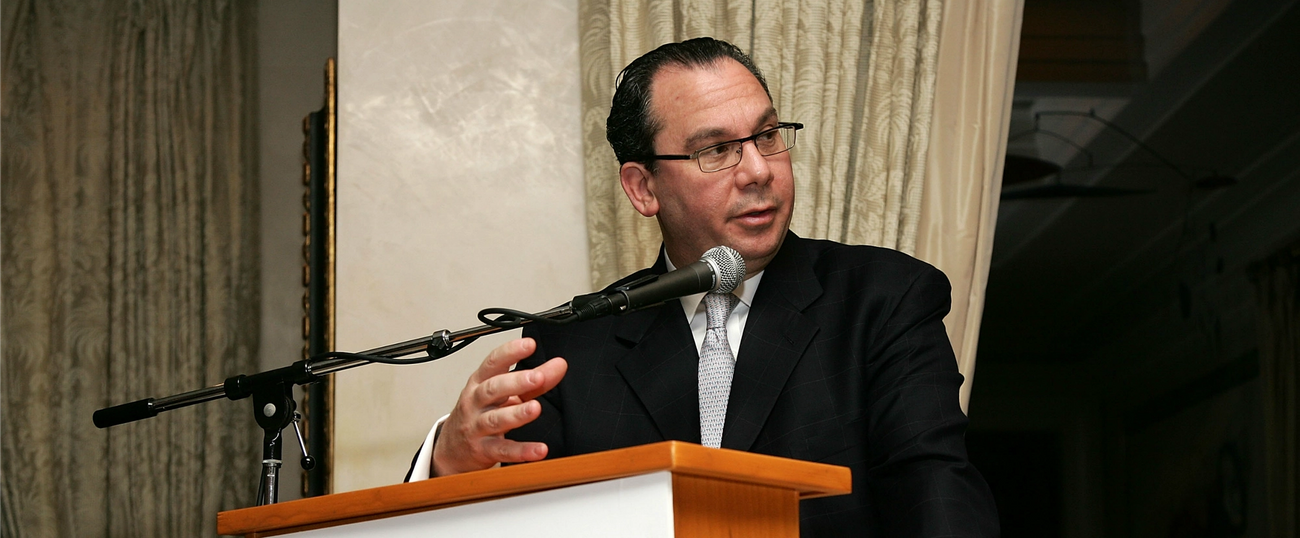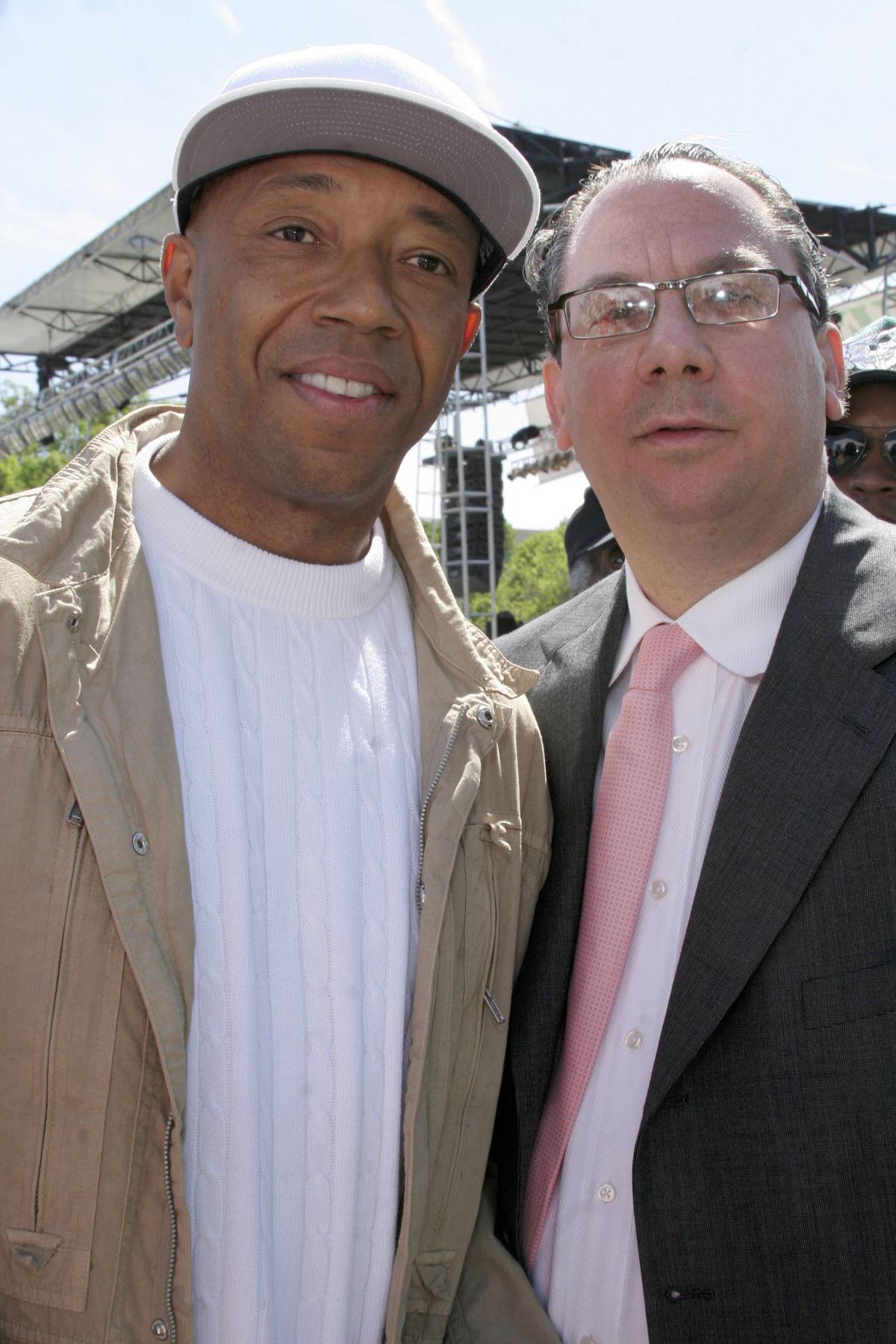Why Was Rabbi Marc Schneier Honored for Jewish American History Month?
The ‘rabbi to the stars’ will reportedly step down at the end of the year as spiritual leader of The Hamptons Synagogue, a congregation he founded




Rabbi Marc Schneier is a polarizing figure. To his supporters, the Yeshiva University-educated founder of The Hampton Synagogue is a peerless institution-builder and community leader. To his detractors, he’s indulged an appetite for fame and wealth while plowing his way through five marriages, destroying fragile bonds of trust with his congregants in the process.
The rabbi has a complicated public persona, to say the least. After all, how do you weigh decades’ worth of work building bridges between Jews and Muslims, and Jews and African Americans—reportedly to the point of attempting to meet secretly with Louis Farrakhan—against the alleged abandonment of a wife and 2-year-old child for an Israeli ex-flight attendant 20 years younger than him, as The New York Post recently reported? Yes, Schneier created the thriving Hampton Synagogue out of nothing—partly thanks help from Steven Spielberg, among other wealthy donors—fostering a vibrant Jewish enclave within one of the New York metro region’s fortresses of gentile life. Then again, there’s the record of infidelity, the reported 2011 request from the orthodox Rabbinical Council of America that Schneier resign his post, and now, his resignation as reported by the Post, effective at the end of the year.
These are tough questions to work through. In the midst of them, Schneier was honored during a May 25 Capital Hill event as one of six “outstanding Jewish Americans who have greatly enriched the fabric of American life” last month, as part of the U.S. Senate’s celebration of Jewish American Heritage Month.
Photos included on an email from the Hampton Synagogue show Schneier receiving the award from Virginia Democratic Senator Tim Kaine, and appearing alongside Republican Senator Orrin Hatch of Utah and Democratic Senator Cory Booker of New Jersey. Ezra Friedlander, whose public relations firm The Friedlander Group organized the Capitol Hill event and who said he was largely responsible for selecting the event’s honorees, explained that he was aware of the April 24 New York Post article prior to the event, but that it had no impact on his decision to honor Schneier.

Friedlander said that Schneier’s private life didn’t have any bearing on his record of achievement in inter-communal relations, which was the reason for the award. “The rabbi was honored for something very, very specific and no one has ever contradicted that accomplishment and what he’s achieved,” Friedlander said. He added that “99.9%” of the feedback he’s received on the decision to honor Schneier has been positive, and thinks it would be unfair for a single New York Post report to weigh so heavily in a decision to honor him.
“The newspaper article cannot be the final arbiter,” he said.
Schneier is the co-author of Shared Dreams, a book about Martin Luther King, Jr’s relationship with the American Jewish community, and founded the Foundation for Ethnic Understanding, an inter-communal relations group that counts hip-hop mogul Russel Simmons among its board members. As Friedlander argues, the worrying state of American political discourse makes it especially appropriate to recognize work like Schneier’s. “This issue of race relations between Jews and African Americas and Jewish and Muslim communities is a very important topic in light of everything that’s going on in the current political climate,” Friedlander said.
But Schneier’s been a source of discomfort in certain segments of the New York Jewish community for a few years now. The New York Post article quoted an Orthodox women who had attended Schneier’s services calling his behavior “an abuse of power.” She added, “A lot of women admire and look up to rabbis, especially in [Orthodox Judaism], because there are no female rabbis. It’s horrible for a rabbi to abuse that trust, [but] a lot of people look the other way because he’s a powerful man.”
In 2011, Tablet’s Allison Hoffman profiled Schneier, not long after his fourth marriage fell apart and grainy photos of him on vacation with his new girlfriend appeared in the New York Daily News. Hoffman wondered whether the still-popular Schneier, who at that point had been markedly absent from Newsweek’s ranking of the top 50 most influential rabbis in America since 2009, was even capable of getting himself into the kind of trouble that could tank his career for good. “At this point, it is hard to imagine what kind of scandal would induce the rabbi’s wealthy backers to withdraw their support from a man who seems, to the casual onlooker, like an odd fit as a communal role model and the leader of a religious institution,” Hoffman wrote.
From the looks of it, not much has changed. The New York Post report contains the sort of details that might give some Hampton Synagogue congregants pause—even if it sounds like one of the more lit Jewish houses of worship in existence:
Morality—or lack thereof—wasn’t a big concern for many synagogue-goers.
“The congregation was out to party. They come for the 3 F’s—fun, food, and f - - king,” says Esther Muller, a Columbus Circle resident who works in real estate and has known Schneier for decades.
The weekly Saturday kiddish—a celebratory meal after services—was legendary.
“Twelve different kinds of herring—for the 12 tribes,” says Irwin Graulich, 64, who works in communications and lives in New Rochelle.
As one congregant told the Post, “King Solomon had 20 wives. Five is nothing.”
Plenty of people seem to agree. Hank Sheinkopf, a Hampton Synagogue-goer who claimed to speak on Schneier’s behalf, said that the shul is still packed on the weekends, and is home to the only daily minyan in eastern Long Island. “You know the old expression that 60 million French people can’t be wrong?,” Sheinkopf said. “Eight-hundred congregants on a Shabbos can’t be wrong, either.”
According to Sheinkopf, though Schneier will step down as rabbi of the The Hampton Syangogue at the end of the year, he “will remain post January 1, 2017, engaged within the community but not as its spiritual leader as he announced.”
Previous: Mayoral Hopefuls Head to Hampton Synagogue
Related: Rabbi Marc Schneier Hampton Synagogue Caters to New York’s Wealthy
Armin Rosen is a staff writer for Tablet Magazine.